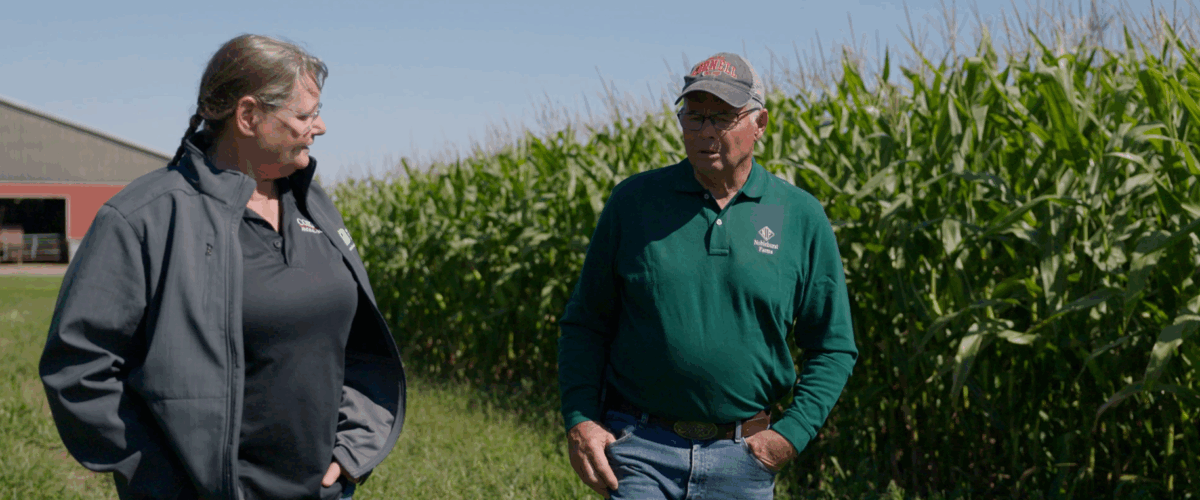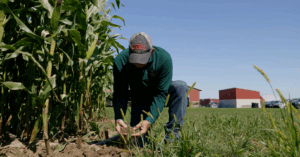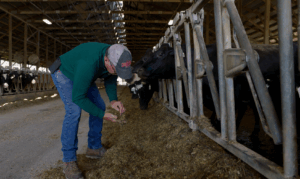
On the Farm: DSWR reveals efficiencies for sixth-generation New York farmer
November 12, 2025
 As DSWR provides data to validate environmentally sustainable farming practices, dairy farmers are also looking to the research to identify ways to operate more efficiently. Rob Noble is working closely with Cornell University researchers on trials at his operation, Noblehurst Farms, in western New York. “We’re excited to see the results,” he said.
As DSWR provides data to validate environmentally sustainable farming practices, dairy farmers are also looking to the research to identify ways to operate more efficiently. Rob Noble is working closely with Cornell University researchers on trials at his operation, Noblehurst Farms, in western New York. “We’re excited to see the results,” he said.
Why do you feel it is important for your farm to participate in DSWR?
Our reason for participating is to better understand what we can do with the inputs that we have. We’re testing the manure products (evaporative and flocculated solids), for example, to see if they can make the soil healthier and also make us more efficient. This project is going to help us determine if by removing the liquid from the manure we can recycle the water and better utilize the nitrogen, potassium and phosphorus in the solids. So, if it makes sense to invest in the processing of that manure, we might look at doing that. We’re excited to see the results and whether we can do a better job with our resources.
What is your relationship like with the Cornell University research team?
Our family has a long tradition with Cornell. We’ve been involved in various research projects. We’ve tried to provide plots and other available resources for the team, when possible. The researchers have input on what we’re doing, and we certainly have input on how we would like to do things with the tools and the resources we have available. So, it’s been a win-win.
What does sustainability mean to you?
 Sustainability for our farm is to be able to keep this ground in the best condition possible. Certainly with minimum tillage that’s a possibility, providing the organic matter to keep that soil structure healthy, providing good drainage, putting that water where it should be, not necessarily where it’s going to wash the soil away. There’s always something better that we could do, so we try to keep it sustainable because we want the farm to continue for future generations.
Sustainability for our farm is to be able to keep this ground in the best condition possible. Certainly with minimum tillage that’s a possibility, providing the organic matter to keep that soil structure healthy, providing good drainage, putting that water where it should be, not necessarily where it’s going to wash the soil away. There’s always something better that we could do, so we try to keep it sustainable because we want the farm to continue for future generations.
What are you doing at your farm to be more sustainable?
We work with a crop consultant who helps us with crop needs, and balancing for nitrogen, phosphorus and potassium. Primarily, our fertilizer program is manure from the cows. We try to use all the resources that we have here to offset the costs of growing the crop. We’ve gone from the moldboard plow to a strip-till program — so now saving on fuel, time, and machinery wear and tear. It also maintains that soil profile.
What benefits are you seeing from participating in DSWR?
The main benefit is efficiency. We are paying attention to the detailed information the researchers are collecting, whether it’s the amount of nitrogen needed to grow the crop, the way we apply our inputs or the greenhouse gas emissions that come out of the soil. Those are all details we need for us to be more efficient in our farming practices.
What do you hope comes from your involvement in the project?
Beyond our farm, I want this research to be of value to other dairy farmers. They’re going to be able to utilize all the information that’s being gathered. We try to lead by example. I’m proud to be a dairy farmer. I’m proud to be in agriculture, certainly. And I’d like to share that with whoever we can reach out to.